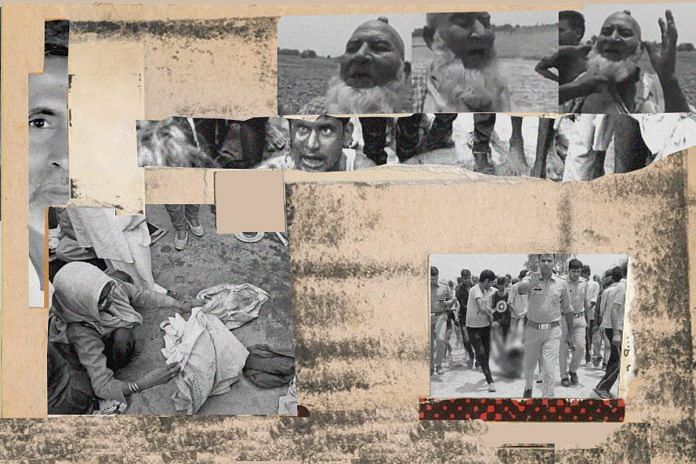The Supreme Court Tuesday said that Parliament must bring a law that instils fear in perpetrators of mob violence, setting a four-week deadline for the Centre and states to issue guidelines to curb ‘mobocracy’.
Hearing pleas filed by activist Tehseen Poonawala and Mahatma Gandhi’s great-grandson Tushar Gandhi, the court observed a ‘growing numbness’ among the public toward mob lynchings.
ThePrint asks: Can a new lynching law prevent ‘mobocracy’ or does the political climate need to change?
The political climate of the country is inclusive, not antagonistic
 Dr Syed Zafar Islam
Dr Syed Zafar Islam
National spokesperson, BJP
It is important to realise, especially in the light of the Supreme Court’s observations, that the BJP and Prime Minister Narendra Modi have always spoken out against mob lynching. Early this year, the PM took the podium in Ahmedabad and made it amply clear that “no person has the right to take the law into his own hands”.
We need to realise that Hindus in India do worship cows. They are sacred animals. However, vigilantes masquerading as religious people are not something anyone supports. These are anti-social elements who will be tried according to law. If they are found guilty, they will be punished.
Whether we need a special law or not is something that can now be debated in Parliament. But there are already laws to deal with this. There are systems for punishing people who are responsible for such crimes. The fast track court in Jharkhand is one such example of the law taking its course.
No one in the BJP endorses mob lynching or such violence. State and local administration must also do their bit to ensure that such incidents are not repeated.
The political climate in the country is one of inclusiveness. I don’t know about any other party, but the BJP would never extend support to or create a climate that is antagonistic towards any community.
Question that needs to be asked is why lynchings were unheard of before 2014
 Manish Tewari
Manish Tewari
National spokesperson, Congress
It is extremely gratifying to note that the Supreme Court has taken cognisance of the spate of lynchings that have taken place across the country. Primarily, in the name of cow vigilantism, but also inspired by rumours on social media platforms wrongly targeting innocent people for imagined crimes. These range from child lifting to the mere fact that they belong to a particular religion.
It is unfortunate that the NDA government has completely abdicated all sense of responsibility and allowed this horrendous activity to become the new normal. However, the question that needs to be asked is that why lynchings were unheard of before 2014.
Why is it that they have become the new norm after the current government came to power? The answer is very obvious – a systematic climate of anarchy has been created across the country. Such a climate emboldens people to take the law into their own hands.
The NDA-BJP government from the very top to the bottom is squarely responsible for instituting this culture of intimidation and violence. The most damning evidence of their complicity is union ministers garlanding, applauding those convicted of these heinous crimes.
More than any law and order, it is the political climate that needs to be tempered down. This can only happen once the current dispensation is voted out of office.
Any anti-lynching law will first need to address the root cause: Fake news
 Manuraj Shunmugasundaram
Manuraj Shunmugasundaram
Advocate, and Spokesperson, DMK
The situation is bad when a national campaign is launched to highlight the need to tackle mob lynching. India Spend reported that 33 people have been killed in 69 mob attacks in the last 18 months. The government has long turned a blind eye to civil society and shown no initiative to tackle the increasing number of mob attacks. So the directive from the Supreme Court to consider a separate ‘anti-lynching law’ should serve as a timely reminder to the government of its duties.
By far, the strongest proponent for a separate law has been All India Majlis-e-Ittehadul Muslimeen (AIMIM) chief Asaduddin Owaisi. Owaisi has proposed a private member bill, which has provisions for special courts, special judges, setting up of special investigation teams and a special public prosecutor.However, the law does little to address the root cause of mob attacks: fake news. Seventy-seven per cent of mob violence cases were attributed to the spread of fake news through social media. Therefore, any law must necessarily include safeguards and checks against the viral spread of fake news.
But, laws are limited in their scope and their enforceability. No law will be effective without addressing the communal animus. Since the BJP government came to power in 2014, there has been a spike in violent incidents related to transportation of cattle for slaughter.
The efforts to curtail the atrocities by ‘gau rakshaks’ has been weak, and is characterised best by Modi’s insipid statements on the issue. On 23 June 2017, 17-year-old Junaid Khan was brutally killed on the suspicion that he was transporting beef on a train. Speaking in response to this horrific crime, Modi on 29 June said in Gujarat that “killing people in the name of gau bhakti is not acceptable”. It was hardly a rap-on-the-knuckle.
Going one step further, minister Jayant Sinha’s political acceptance of bigotry was on show when he recently garlanded eight men who have been convicted for lynching a meat trader.
It makes one wonder whether any legislation enacted by this government will be effective when its own representatives are busy with such egregious felicitations.
New law won’t change rising tide of hate violence in our country
 Harsh Mander
Harsh Mander
Former IAS officer and social activist
A law to deal with mob lynching, as sought by the Supreme Court, is welcome. But a new law in itself will not end the epidemic of lynching. Lynching, ultimately, is not an outcome of the failure of the design of law. It results from the country’s ruling establishment providing an enabling climate for hate attacks.
The message is clear when the Prime Minister and BJP chief ministers don’t condemn the attacks, or even express sympathy with the victims. When senior ministers and elected representatives defend the attackers, honour the lynching-accused, and put the blame on the victims, the innuendo is that the victim or their community is somehow guilty.
During the journey of the Karwan-e-Mohabbat to 12 states around the country to visit the victims of hate violence, we found a common pattern. First, orchestrated rumours which incite mob violence; second, the extreme cruelty of the attacks, most of which target Muslims, sometimes Dalits, and more recently in the context of child-lifting rumours, any stranger; third, the celebratory video-taping of the lynching; fourth, the failure of interventions by bystanders to save the victims and of any public compassion; fifth, no visits or expressions of support by local politicians and officials; and last, the deliberate failures of the police to ensure justice to the victims. Instead, the reverse is often done, with the police registering criminal cases against the victim or his/her family.
It is these that must be battled, and these are battles we must wage in polity and society. A new law by itself will not change the rising tide of hate violence in our country.
SC judgment questions ‘action-reaction’ theory evoked by BJP leaders to justify lynching
 Hilal Ahmed
Hilal Ahmed
Associate professor, CSDS
The Supreme Court’s observation that “the State is duty-bound to ensure law and order and to prevent mobocracy” with regard to the incidents of lynching clearly points at the inherent relationship between legal safeguards and political morality.
The court stridently argues that the existing framework of law is inadequate to deal with mob lynching as a crime. Hence, it has ordered that Parliament should produce a stricter law so that mob lynching as a specific form of collective violence can be made punishable.
At the same time, the judgment also questions the existing political morality – especially the strategic calmness of the government (read ruling party) on mob lynching. The court instructs the government to act against those who kill innocent individuals and create an environment of terror.
This observation actually widens the scope of the judgment, especially on cow vigilantism. It seems to question the famous ‘action-reaction’ theory, which is often evoked by the BJP leaders to justify their stand on Hindutva-driven collective violence. The judgment reminds us that the argument that cow worshippers feel threatened and humiliated, and on some occasions, ‘react’ naturally to kill ‘cow-killers’ goes against our legal-constitutional values.
The judgment, in this sense, invokes the State-Government distinction, something that Ambedkar conceptualised during the time of making the Constitution: it orders the ‘State’ to produce a law and instructs the ‘Government’ to act according to the political morality defined by the Constitution.
In other words, a law against lynching must be supported by an active political commitment against mobocracy and violent majoritarianism.
Special laws won’t help as 80% lynching is politically motivated
 Nadeem Khan
Nadeem Khan
Campaigner, United Against Hate
Some people have filed a petition for a special act for cases of mob lynching, but there is no need for a special law. The Indian Penal Code is sufficient for that. Under IPC 302, there is a provision for capital punishment when an act of murder is committed.
Special laws won’t help simply because 80 per cent of mob lynching cases are politically motivated. Those lynched are mostly Muslims or the marginalised. By the time the case is registered, if at all it is, the investigation team botches it up.
The police are under immense pressure to suppress these cases as well. It is no surprise considering Jayant Sinha, a union minister, goes around garlanding convicts. Haryana additional advocate general Naveen Kaushik helped the main accused in the Junaid lynching case. Mahesh Sharma, a senior BJP leader, visited the family of the accused in the Akhlaq lynching case.
Over the last year and a half, we have seen the way lynching victims and accused have been treated. From cow vigilantism to child lifting, the impunity of those who lynch has only been bolstered by the current political climate.
If the Supreme Court really wants to help, it should set up a court-monitored SIT. We need to fix the investigation, else these laws in name will never bring justice.
Even if a law is passed, police will continue to botch up lynching investigations
 Shivam Vij
Shivam Vij
Contributing Editor, ThePrint
Qasim Qureshi, a meat seller in Hapur in western Uttar Pradesh, was lynched to death a month ago. The false charges of cow slaughter are by now familiar. Another Muslim man, Samiuddin, was assaulted by Bajrang Dal-backed men.
A month later, the main accused has walked out of jail with bail in just 18 days. Such express bail has been possible because the police have botched up the case. From the start, the police have been busy with a cover-up. The police helped clear the path through which the body was dragged out. A photo showed a policeman trying to stop the photographers from taking a shot, instead of stopping people from dragging the body of the victim.
The police have registered it as a road rage dispute, not a communal incident. The Bajrang Dal and the RSS are busy defending the accused, who says he didn’t do it but yes, it was a cow slaughter issue. At every step the UP police is busy making sure that no one will get convicted, or the killers brought to justice.
The Supreme Court judgment today asked Parliament to enact a new law to prevent and punish lynching. It is sad that the solution to every problem in this country is a new law, but not making sure the police do their job. There is no dearth of laws.
The Supreme Court judgment says action should be taken against negligent policemen etc., but in the absence of police autonomy, this is going nowhere. Even if you create a new law, the police will botch up investigations as it has been doing in Hapur.
The only thing this judgment will achieve is 15 minutes of fame for some activists and lawyers. It is the political shield to the lynch mobs that needs changing.
Not first time stricter laws demanded, unfortunately they don’t work
 Maneesh Chhibber
Maneesh Chhibber
Editor (Investigations & Special Projects), ThePrint
After the December 2012 gangrape and murder in Delhi, there were calls for stricter laws to deal with rape.
Unfortunately, despite the recommendations of the Justice J.S. Verma committee, followed by changes in the law, rapes continue to take place at an alarming rate.
Now the Supreme Court has called for a new law to check lynching by self-styled cow vigilantes. Will it serve any purpose?
I have my doubts. The reason is that many of the lynching incidents that we see in India are being carried out with a clear aim to polarise for political gains. More than a new or amended law, what is required is political will.
Sadly, our political leadership doesn’t have the will to take on the self-styled upholders of ‘sanskar’ (value-system).
Moreover, such a step doesn’t bring votes; giving sanctity to some of the lynching does – remember the recent picture of minister Jayant Sinha garlanding men convicted of killing a meat trader?
Several years ago, when young people marrying into the same ‘gotra’ (clan) started turning into a law and order issue in Haryana, several such couples came to the Punjab and Haryana high court for protection from khap panchayats.
Upset with the worrying trend, the chief justice of the high court at that time – Justice B.K. Roy – summoned the Haryana advocate general (AG) and made it clear to him that protecting the life and liberty of the citizens, including the young couples, was the responsibility of the state government. In case, any couple was harmed, the responsibility would be that of the district superintendent of police, Roy told the AG.
For many months, there were no new reports of khap panchayats terrorising anybody for marrying into the same gotra.
Will to take on the anti-social elements – one that has to be exhibited by the so-called strong government and not by courts – will always work better than any law. If the law could be the answer to every ill, why are murders still committed when we have Section 302 in the Indian Penal Code, under which murder is punishable with death or life sentence and fine.
Compiled by Deeksha Bhardwaj, journalist at ThePrint.



